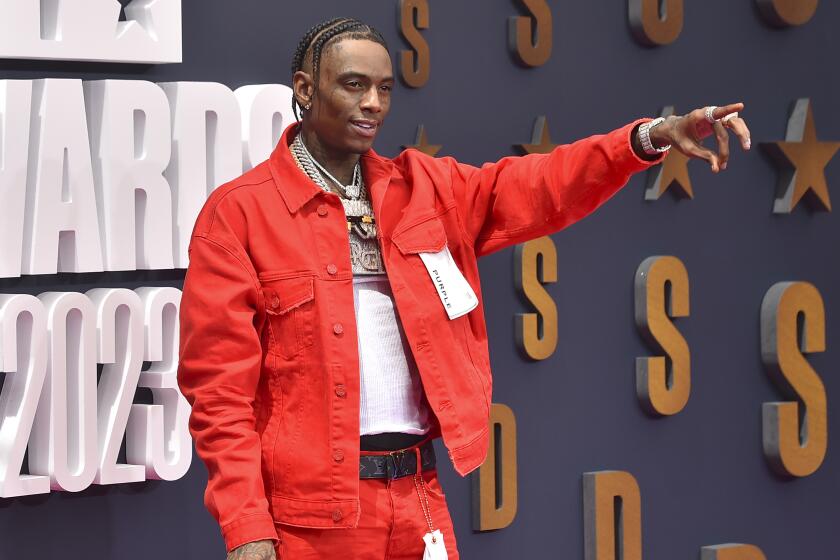Hip-Hop Needs More Than a Good Beat to Be a Political Force
- Share via
Music mogul Russell Simmons and the Hip-Hop Summit Action Network have been touring the U.S. registering voters, and they recently had their best rally, reportedly signing up more than 111,000 hip-hop fans in Missouri.
That sounds impressive. But activation without proper education won’t bring the long-term effects needed for the hip-hop generation to become a political force. Young black voters don’t watch the news or read newspapers; they spend more time watching BET than CNN. And that isn’t a diss so much as a reality check. I worry that we are merely registering bodies to cast votes and not nurturing a fully functioning, well-informed electorate.
The Hip-Hop Summit Action Network’s agenda is ambitious. Beyond the implied objective of dumping George W. Bush in November, the group, as it states on its website, is “dedicated to harnessing the cultural relevance of hip-hop music to serve as a catalyst for education advocacy and other societal concerns fundamental to the well-being of at-risk youth throughout the United States.”
Hip-hop music is the voice of America’s poor blacks and Latinos. These two minority groups face many of the same challenges, but they deserve separate political agendas.
When you throw in the other part of the hip-hop audience -- the white negrophiles from the suburbs -- you begin to realize that the hip-hop nation is a hodgepodge of people with conflicting values, politics and ideologies. Activating the hip-hop nation is a good idea, but it’s got its problems.
First, there is the presumption that putting rappers at the podium will turn millions of black kids into a political force. But most of the millions of people who buy hip-hop music these days are white, and they have little or no comprehension of the deeper meaning of hip-hop culture or the social forces that begat it. They know only about rap music, break-dancing and baggy clothes. Young white kids can’t truly relate to being black, but many can relate to being alienated. They grasp that message, along with the cartoonish violence, slanguistics and fantastical opulence of hip-hop life. They can’t be rallied to adopt hip-hop’s social agenda because they only listen to hip-hop, while we live it every day.
The second problem is trying to awaken and rally a subculture traditionally united against the establishment without a proper primer, relying instead on horse sense.
Didn’t Simmons miss a chance to coalesce the hip-hop community 20 years ago when hip-hop was equal parts politics and party music? When Simmons sold his company, Def Jam, into the mainstream, he sold the soul and consciousness of the music. Now he wants to inject a shot of consciousness and new-age sensibility into a community of apathetic, disillusioned young adults raised on a diet of watered-down fraternity rap and deafened by the ching-ching and the bling-bling that the music has devolved into. His political signal suffers from a proliferation of noise and an absence of a single, coherent message.
These hip-hop political rallies are heavy with lights, cameras and just enough action to keep everyone happy. They are swollen with star power from has-been, never-were and struggling rappers. Many of these rappers are newly registered themselves, trying to tell others how to vote. Young people get registered at these events, but few know how to use their vote to effect change beyond choosing a new president.
Maybe that’s all they need to know -- for now. But the power of the vote is important all year round, not just in the worst of times, and that message is missing from the rush to register.
The push to rally the hip-hop generation is driven too much by partisan politics and artists intent on promoting their product behind the veil of political activism and not enough by a real political agenda from start to finish.
The Hip-Hop Summit leadership wants to link an ambitious wish list of political reforms to a generation too hypnotized by $10,000 spinning car rims to grasp even the most basic tenets of economic and political responsibility.
The new hip-hop electorate may help get Bush out of office, but it remains to be seen if it will be a real force for change.
*
Jimi Izrael writes a column, What Iz It, for Africana.com. His website: www.jimiizrael.com.
More to Read
The biggest entertainment stories
Get our big stories about Hollywood, film, television, music, arts, culture and more right in your inbox as soon as they publish.
You may occasionally receive promotional content from the Los Angeles Times.










